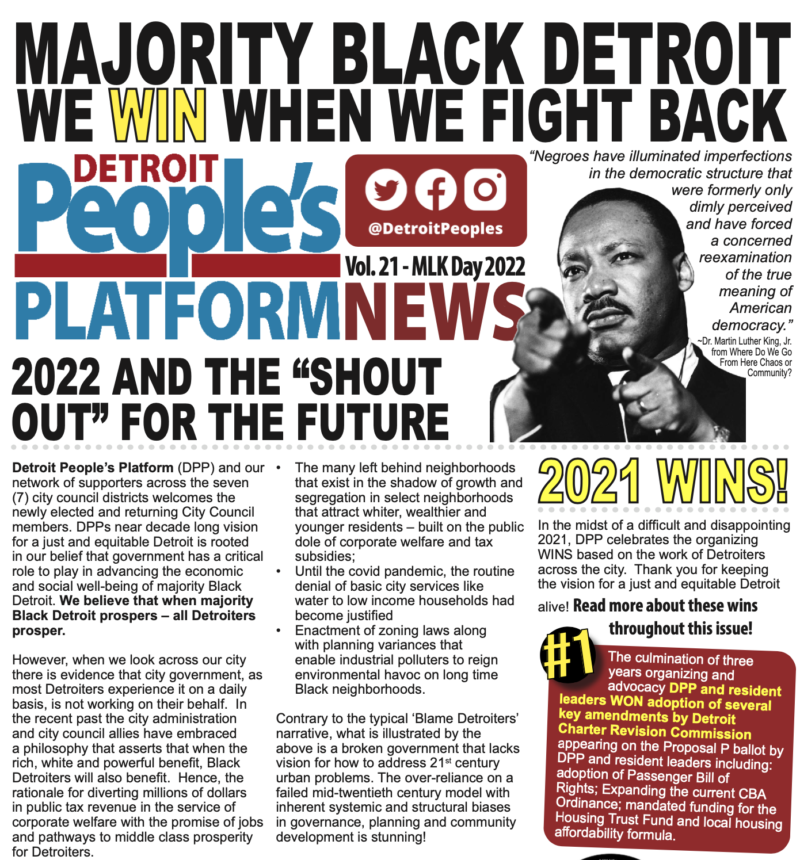Reading Between the Lines: Budgeting for Private Developers, Not for Detroiters
From the 2022 Martin Luther King Day edition of the Detroit People's Platform NEWS.
The administration has touted the financial state of Detroit as a sign of good governance, pointing to an arduous climb out of municipal bankruptcy to a $100 million budget surplus, brought about by an increase in economic development resulting in an increased and significant revenue return to the city.
Just a few months ago in September 2021, the Office of Budget reported that, due in part to the administration’s economic development plan, the city will bring in $111 million more than expected in revenue, increasing spending by about $12 million compared to last year’s budget. On top of that, to help address some hardships caused by the pandemic, Detroit has received an additional $826 million in federal stimulus funding to add to the city budget over the next four years. In budgetary terms, and in contrast to prior years, it would appear that Detroit’s financial cup “runneth over”.
At first glance all of this looks like a giant step in a positive direction for Detroit residents. The assumption here is that more money leads to more and improved services for Detroiters and overall improved quality of life. However, sometimes this assumption overshadows the real story that remains invisible to the average Detroiter and informs the reality that we see on the ground in our neighborhoods.
For example, for this current 2021-2022 budget year, the city is working with about $1.1 billion is general fund money—city generated dollars that can be spent on any municipal service. About a third of that revenue comes from income taxes while only 10% comes from property taxes. Thus, most of the tax burden falls on workers—who are mostly Black and working-class Detroiters—and not owners of property—the latter who are largely non-Detroit residents, are wealthy, white land developers, like Dan Gilbert.
This taxing scheme is not by chance, it is by design. Part of the administration’s economic growth model is to provide investors with huge tax breaks to incentivize economic development. That is, we pay people big bucks to create economic development projects and related businesses in Detroit. Currently, Detroit has 17 tax abatement programs totaling nearly $100 million in tax giveaways annually.
Tax-diversion and tax abatement schemes for economic development include policies like tax increment financing (TIFs), that divert much needed tax revenues from the Commons including public libraries, schools, and other public investments* that average Detroiters and their families could truly benefit from. If Detroit taxed land developers like they do workers, we estimate the city would have $100 million1 more in property tax revenue, which would make it the largest revenue source for the city (as it is in most cities).
Also, the state legislature just passed an amendment in SB 671 that makes these types of taxing incentives even more lucrative for developers and easier to obtain. This means larger tax giveaways and tax diversions from our general fund which consequently results in further public and community disinvestment and service and institutional decline in the neighborhoods and communities where the majority of Black Detroiters live.
Remember, any budget is a moral document and statement of values and priorities, whether it’s a budget created by an individual, a family, a school, a city, or a nation. How resources are allocated identifies what is important to the creators of the budget. To understand the whole picture, however, we must look at the fight for resources before they are budgeted. It is helpful to evaluate how the city’s current economic development policies and the accompanying tax benefits are used to build luxury hotels, apartments, stadiums, entertainment districts, etc. and how that model of investment actually starves our Commons that includes our neighborhood libraries, parks, schools, and transit system. The conclusion is that the current model of economic growth prioritizes private developers and not Detroiters (YOU).
This month, starting January 18th, the City of Detroit will hold its annual Budget Community Forum in each City Council District so that residents can directly tell the city how they want city budget resources to be spent.. Let’s show up and demand our public dollars back so we can in good faith begin to truly build a budget that reflects the morals and priorities of majority Black Detroit.
The Budget Priorities Community Forum will be a virtual community outreach meeting. For more information about how to participate: detroitmi.gov/events/notice-public-outreach-annual-budget-priorities-forums
1This 100 million dollar figure is based on our own calculations of tax capture by Brownfield TIFs (can provide data if necessary) and
1) property tax subsidies calculated by Good Jobs First: taxbreaktracker.goodjobsfirst.org/prog.phpstate=MI&state_jurisdiction1=MI+Detroit&state_jurisdiction2=&state_jurisdiction3=
2) tax capture by DDA as reported by Free Press: freep.com/story/money/business/john-gallagher/2019/06/04/downtown-detroit-property-taxes/3626319002/
Good Jobs First reports about $40 million in subsidies but does not contain DDA tax extraction and Brownfield TIFs. Free Press reports $35 million in taxes captured by DDA. And our data shows Brownfields are now capturing about $25 million. This adds up to $100 million in property tax losses.
From the 2022 Martin Luther King Day edition of the Detroit People's Platform NEWS.
People's Platform NEWS 21
Vol. 21, Martin Luther King Day 2022
Contents:
- 2022 and the Shout Out for the Future
- 2021 WINS!
- Essential Bus Riders are Crucial to Restoring Public Transit in 2022
- Reading Between the Lines: Budgeting for Private Developers not for Detroiters
- HOUSING TRUST FUND - A community driven solution to provide homes for all!
- Detroit has a transparency problem because Michigan has a transparency problem
- Beniteau Stellantis CBA Update
- 2022 Detroit City Council Contact Info
